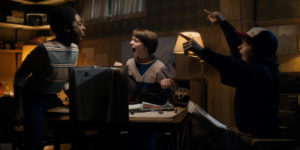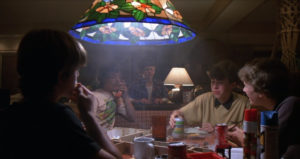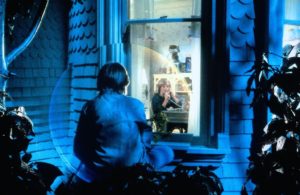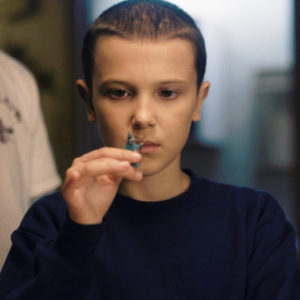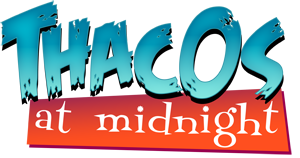The new Netflix series Stranger Things has been blowing up my social media feed for a couple of weeks now. I started watching it myself, at first with a little skepticism. From what I’d seen, the show was a little too artfully pandering to my demographic. Turns out, I really like it. I’m not quite through it, but I’ve enjoyed every episode thus far.
In common with most Gen-X men, I do indeed feel a lot of nostalgia for the world presented in the show. Of course, I also remember nuclear war paranoia, Satanic cult panics and morning prayers in my public school… but let’s ignore that for now. The boys in particular are familiar archetypes from young adult media of the period. These are the smart outsiders. It’s basically the cast of E.T. or The Explorers or even The Goonies, except facing an interdimensional horror. The archetypes ring true because they are not inaccurate.
Stranger Things (2016): The joy of slaughter!
I am nearly the same age as the boys in the show. I’m just a bit younger, but their fashion sense, their bikes, their jokes, and the moral code would have been entirely familiar to me in 1983. In fact, in November of 1983, I was a part of a secret club with a few other boys. Really, it was just a group of friends who lived fairly close and went to the same school. But we took it seriously. We even had codenames. I am ashamed to admit I asked to be called “The Professor.” We considered ourselves the only people to properly understand the world, the only kids at our school with a really good handle on what was fun and what was right and honourable.
(In another eerie similarity, because of my evangelical background I strongly believed in the physical existence of demons and even believed I had encountered one in a period of sleep paralysis. I honestly feared paranormal attacks from another dimension and spent a period of my childhood terrified of being outside at night, or alone in a dark house….because there might be actual Monsters. That’s probably a post for a different time.)
E.T.: The Extraterrestrial (1983): Same game table, but Stranger Things forgot that everyone smoked in the early 1980s.
We played tabletop RPGs for the bulk of each summer. We also rode bikes everywhere. We roamed the neighbourhood in a loose pack. We played “Capture the Flag” in the park. We played on an abandoned steam locomotive near a brick factory and explored junk yards. We ran from bullies, or occasionally screamed insults at them from a safe distance. They called us fags and we called them morons. Fist fights happened, but usually ended after some scuffling and wrestling. We played video games and argued about Star Wars. We had discussions about whether or not it is possible to have more than one best friend.
While I am still in touch with some of those boys (now all in their 40s) we inevitably started to grow apart. The commonality we had was built (in most cases) on proximity, rather than temperament. As we became individuals the differences became more important. But while it lasted, they were friends as true as any I’ve had. It was Us against The World.
Later in life, I realized how much of that dynamic was built on a sort of tribalism and elitism, one that explicitly excluded actual outsiders. We thought we were the outcasts, but we weren’t. We were middle-class white boys with a popular hobby. Heck, there were stores dedicated to selling roleplaying games and a Saturday morning cartoon based on Dungeons & Dragons. The real outsiders were the kids who were born male but didn’t properly present as a nerd or a jock, who had a trace of “queer” or just didn’t have the right hobbies. There were the kids in a lower social class, kids who didn’t have a TV, even kids who didn’t have the same vocabulary. There were children who had no friends at all and we avoided them as rigorously as any of the “popular” kids were disdained.
The Explorers (1985): Every prepubescent boy knows that girls are best observed without their knowledge and from the safety of a force field bubble.
And of course, there were girls.
Girls (especially before puberty hit us over the head) were a mystery, The Other. We were socialized to disdain them, or consider them valuable only insofar as their ability to act agreeable to boys. They must appreciate the right things in the right ways, and even then they were not necessarily welcome. We could make fun of boys outside our cabal, we could fear them, or fight them, or even befriend them if they passed tests of loyalty and knowledge. Girls were complete enigmas. Even after puberty, after dating, we mostly kept our significant others away from the gaming table, as late as university. They wouldn’t get RPGs in the same way, you know? They wouldn’t get the inside jokes. The off-colour banter would suddenly seem in bad taste. We’d have to act different around them.
Stranger Things totally nailed that, too.
Stranger Things (2016): See? Girls just don’t GET it.
In Stranger Things, Eleven is not just frightening because she’s got strange powers. She threatens the cohesion of the gaming group because she’s a girl. This is explicitly stated in the show. She’s full of mystery. She shakes things up. The boys don’t know how to talk to her, they don’t know how to include her, and the group splits (for a time) because of her presence. She turns their reliable, cohesive world of secret handshakes and specialized knowledge upside down. She’s the outside world, forcing them to change. I don’t know what happens in the show, how or even if that conflict is resolved.
When I look around gaming culture (and larger nerd culture) in the 21st century, I am still seeing that conflict, and the desire to hold on to the all-boy club. Now, they are clubs of men in their 30’s and 40’s trying to reclaim the “swell chums” or secret tribe of their youth. I can understand that impulse, totally. As I get older it is very obvious that the world is moving around me. I can’t keep up with developments, even in my favorite hobby. I understand the desire to hold things in place and try to recapture a feeling or experience that I felt to be empowering, even if it was empowering because it was exclusive.
There is not anything really wrong with that. We all want to belong and to feel our hobbies and habits are unique and special. Socially, we are free to limit our gaming table or groups of friends only to those people who polish our echo chamber. If you want to run a crunchy OSR game only for heteronormative men, by all means. Even if your play involves elements that are offensive or retrograde to some outsiders… that is also your right.
There are two things to remember about that right.
First, it only extends as far as your gaming table. When you go to a convention, you have to accept that the ground rules are different. Every player at your table is going to come from a different culture of role-playing. What they regard as normal will not be the same as what you regard as normal, even if you are both 45-year-old men who cut your teeth on Basic D&D in 1978. Accept that the ground rules are different. You may not need an X-Card at your table. You may have a house rule against people playing genders other than the one they present as. You need to put those aside and play according to the rules of the table and in such a way that you do not alienate the other players. You may think they are too sensitive, too weird, too restrictive. That’s fine. But when you sit down at a public table, the rules of the house apply.
Second… consider that your prepubescent tribe of friends may not be best model for a game group in your adult years. Consider that you cannot put the lightning back in the bottle. Remember that those boyhood cabals drifted apart because they made contact with the outside world. Your private world, your gaming table, your inside jokes…. there is nothing wrong with them if that is all you want from your hobby. But if you want to engage with the world outside your gaming table, you have to be prepared to welcome the existence of those whose enjoyment of the hobby was cut from an entirely different cloth.
Game cons and forums are full of grouchy guys talking about how the world of RPGs is just not what it was. I’m not talking about OSR gamers or grognards. I hear it from Vampire players, from Warhammer Fantasy RPG players, from boffer LARPers and even diceless Amber players. Fifteen years ago this sort of thing was mostly ironic posturing and guys in their late 20s waving imaginary canes in good humour.
At some point this irony went septic and turned into real resentment. We hated the change. We did’t like the things that threatened our “way of life” and the grumbling turned to actual bile. Actual death threats have been leveled against game designers whose vision did not match that of the old boy’s view of the hobby.
And that’s weird, because it’s not like nostalgia is going anywhere. There are still plenty of people willing to repackage and write and sell us the same experiences we had when we were 12 – talented game writers who are ready to keep bottling the lightning from our youth. That segment of the hobby is still lively and growing and contains a lot of worthwhile product and ongoing innovation. But nostalgia only takes us so far as a collective of hobbyists. There is always going to be a new wave of gamers discovering the joy of the RPGs and they are going to engage with it in ways we could never expect.
They are creating new game experiences that reflect their world view. They play differently, because their world is different. Encompassing and accepting that difference is a way to make your world bigger and make your gaming table a more welcoming place. Why not check out their games, and not just the old standards? Check out games written by women, by people of colour, by people of widely different backgrounds than your own. It’s like seeing the hobby through a new set of eyes.
At the very least, you’ll be helping to keep your beloved hobby growing.
And remember, in the end, there is nothing particularly helpful about not wanting to play well with others.
